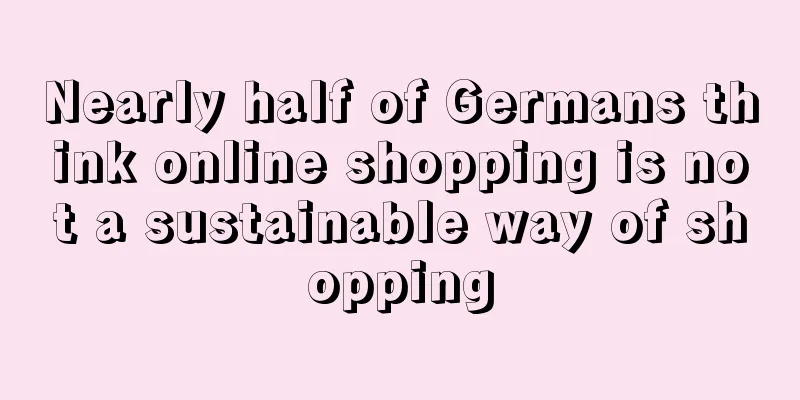Nearly half of Germans think online shopping is not a sustainable way of shopping

|
In the common sense of many Germans, shopping in offline stores is more sustainable than shopping online. About half of Germans ( 46%) even think that e-commerce is not a sustainable way of shopping. However, the opposite is true. According to a survey by market research organization YouGov , online shopping is more in line with the concept of sustainable development.
The survey found that when comparing online shopping and shopping in physical stores , 44% of Germans believe that offline shopping is more sustainable, while only 18% believe that online shopping is more sustainable . In addition, 32% of respondents believe that there is no difference between the two shopping methods, and 11% of Germans have no opinion on this.
The survey also pointed out that when people were asked separately whether e-commerce is a sustainable way of purchasing , 46% of respondents denied it, 28% clearly stated that e-commerce is indeed a sustainable way of purchasing , and about a quarter ( 26%) of respondents had no opinion on this.
Based on this, market research organization YouGov believes that the public perception of " e-commerce is more sustainable " is worse than the survey results show, and people's awareness of e-commerce needs to be further improved. As for why online shopping is more sustainable than offline shopping, consulting firm Oliver Wyman explained: when people shop in offline physical stores, they emit more pollutants due to transportation problems.
Since online shopping is more environmentally friendly, how can we further improve the sustainability of e-commerce ? In this regard, 64% of German consumers believe that buying multiple products at one time can reduce waste and is more in line with sustainability requirements.
In addition, some consumers believe that the return problem is the main obstacle to the development of sustainable e-commerce. To avoid this, many consumers hope that merchants can provide more detailed information about the product ( 49% ) , product images ( 39%) and product videos (29% ).
Nowadays, sustainability has gradually become a trend, and more and more Europeans pay attention to sustainability when shopping. Therefore, merchants can focus more on sustainability to win the hearts of consumers. Germany E-commerce Sustainable |
Recommend
What is Aditya Birla? Aditya Birla Review, Features
Aditya Birla is one of India's largest divers...
Shenzhen seller lost the lawsuit and was ordered to pay suppliers more than 50 million!
The relationship between cross-border sellers and...
What is Yahoo! Japan? Yahoo! Japan Review, Features
Yahoo Japan is a portal website operated by Yahoo ...
Amazon is selling hot! Trump's shocking remarks have made a batch of products popular again
Trump's coming to power has killed some busin...
What is Chairish? Chairish Review, Features
Founded in 2013, Chairish is headquartered in San ...
Zero tolerance for counterfeiting! 64 people sued, over 400 million links removed!
The issue of infringement has become a dark cloud...
What is Crowd Cow? Crowd Cow Review, Features
Crowd Cow is an e-commerce platform for group buy...
Tmall Global incubates 1,000 supernova brands in three years, halving annual fees and offering a year-round "free data package"
There are great benefits for overseas brands land...
What is RoyalPay? RoyalPay Review, Features
RoyalPay is committed to becoming a bridge betwee...
What is GittiGidiyor? GittiGidiyor Review, Features
GittiGidiyor was founded in 2001 and is a Turkish...
SoftBank is making an effort! Korean e-commerce giants Naver and Coupang may become Japanese business partners
According to South Korea's PulseNews , SoftBa...
Amazon builds its own containers and becomes one of the top five trans-Pacific transporters
According to shipping analysts, Amazon is now not...
Amazon cuts cargo flights to slim down as demand weakens
Amazon may scale back flights this year , U.S. ai...
Lacking reliable information, sellers call on the UK HMRC to set up an official account in China
Recently, in order to understand Chinese sellers’...
What is Hippo Cross-border? Hippo Cross-border Review, Features
Hippo Cross-border is committed to assisting tradi...









